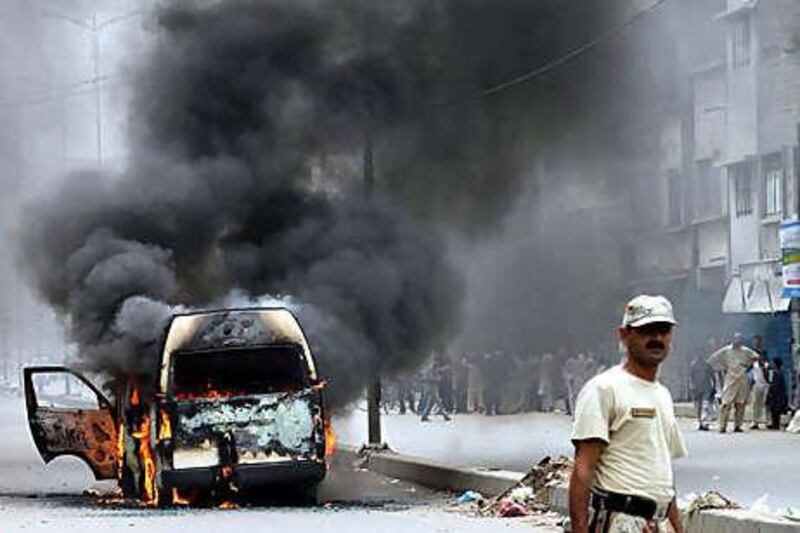Political and ethnic violence erupted in Pakistan's biggest city of Karachi after the murder of an MP, killing 45 people as protesters torched vehicles in a revenge spree, officials said. The politician, who represented the Muttahida Qaumi Movement (MQM), a partner in the Sindh provincial ruling coalition led by the Pakistan Peoples Party, was shot dead by gunmen on motorcycles yesterday. Raza Haider's assassination sparked panic in the teeming city of 16 million, where markets closed and streets emptied as gunfire erupted overnight in parts of the financial capital. Karachi has been largely spared the Taliban and al Qa'eda-linked bomb attacks that have dogged northwest Pakistan, but is plagued by ethnic and sectarian killings, crime and kidnappings. The unrest exacerbated woes in a country battling to contain unprecedented flooding that has killed up to 1,500 people and affected a total of 3.2 million, and trying to contain a diplomatic row with Britain over terrorism. In Karachi dozens of vehicles and several shops were set on fire and more than 90 people were wounded. Police said they stepped up security to prevent major incidents of violence or sabotage, deploying hundreds of officers to protect Mr Haider's funeral. Hamid Parhiar, police surgeon of Sindh province, said 45 people died after the attacks and that 93 people were admitted to hospitals with injuries. Officials described the dead as rickshaw drivers, cab drivers, labourers and passers-by from various ethnic groups who were shot dead in some of the city's most destitute neighbourhoods. "Miscreants torched up to 24 buses and cars last night. They also damaged a petrol station and a few shops in different parts of the city," said the Sindh government spokesman Jameel Soomro. "The violence seemed to be the reaction to yesterday's killing of the MQM MP, but at the same time a third party could exploit the situation to destabilise our democratic government and disturb Karachi," he said. Calm returned to Karachi today and Mr Soomro said orders had been given to paramilitary Rangers forces to "shoot on sight miscreants involved in creating a law and order problem". Police had arrested about 12 suspects in connection with Mr Haider's assassination, a senior police official told AFP. "The suspects include three men belonging to (banned al Qa'eda-linked militant outfit) Lashkar-e-Jhangvi who had been facing charges of targeted killings and been lately released by the courts on bail," he said. Provincial authorities have already banned public political meetings in Karachi in an effort to control intermittent waves of political killings. Tensions are high between coalition partners MQM and the Awami National Party (ANP), which represent different communities in Karachi and so straddle political faultlines in the city. The ANP is the party of more than two million Pashtuns who have escaped poverty and Taliban-linked violence in the northwest for Karachi, where they largely perform menial jobs in transport and construction. MQM represents the city's dominant Urdu-speaking population. It has called for a city shutdown to protest against the politician's killing. Both parties accused each other over targeted killings and analysts say groups were at war in Karachi as part of a power struggle. "There is a pitched war among various groups for political influence and political space in the city," IA Rehman, secretary general of the independent Human Rights Commission of Pakistan (HRCP) told AFP. "Extremist elements take advantage of the situation whenever a law-and-order problem is created in Karachi." The government has not released exact figures, but the HRCP said 260 targeted killing cases were reported in Karachi during the first six months of the year, compared with 156 during the same period in 2009. * AFP
Dozens killed as assassination sparks riots
Outbreaks of violence in Pakistan's largest city of Karachi have killed at least 45 people following the killing of a politician.

Editor's picks
More from the national




